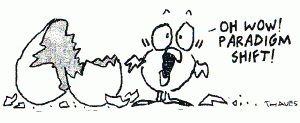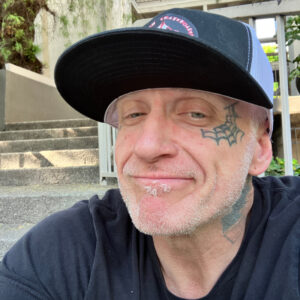In my series on habits – creating them, sustaining them, changing them – I have invited guest bloggers. Here is one you know by now, if you follow my blog. My mom. She provides some great examples of habit changing. She also disputes the idea that we have no control over certain habits (and their results).
_____________
A paradigm is defined as a model or worldview. A paradigm shift is defined as “a fundamental change in approach or underlying assumptions” – let’s say a change in my worldview. For the past eight years I have been experiencing a paradigm shift. When I hit 71, I thought many of the physical changes I was experiencing were symptoms of “old age” such as chronic backaches, foot pain making it impossible to go barefoot even at the beach, and balance issues including occasional falls. Then I discovered a science-based  movement program based on biomechanics (www.nutritiousmovement.com) suggesting these changes were the result of habits I had been repeating for years! WOW! Talk about a shift! What if I could actually change some of these symptoms by changing my habits?!?
movement program based on biomechanics (www.nutritiousmovement.com) suggesting these changes were the result of habits I had been repeating for years! WOW! Talk about a shift! What if I could actually change some of these symptoms by changing my habits?!?
I began taking a look at something as simple as how I hold my feet and how I walk. I say “simple” when in fact these turned out to be critical to many of the habits I had developed and many of the symptoms of “old age” I was experiencing. For example, to be biomechanically aligned my feet need to be straight when I stand and when I walk. What is straight? Where’s the manual that tells me about how the human body – my body – should be aligned so it works optimally with the least amount of physical damage, strain and pain to my joints and muscles for as long as possible?
There is, obviously, no such manual. And the answer about what is straight is getting the outside edges of your feet straight. Simple – yes. Easy – not so much. I notice my habit is to walk more like a duck with my feet turned out thus misaligning everything above such as my ankles, knees, hips, back, shoulders, neck and head. So, I am changing that habit to feet straight. Not easy! Hundreds of times a day – you might say with every step I take – I need to be aware of where my feet are in relation to the surface on which I walk. Aha! So, the key for me is awareness. If I am not aware of what I am doing; i.e., the habit I want to change, I am not able to accomplish that change. See what I mean – simple not easy. It is the payoff that makes it all worthwhile – I walked five miles barefoot last May on a beautiful beach in Maui with no problems!
Another key habit to change for me is becoming aware of where I carry my weight when I stand. My default position is with my weight forward on the balls of my feet with my pelvis out in front. By the simple shifting of my weight back into my heels and getting my hips over my heels, I was able to stop my chronic backaches. Big payoff! Simple, not easy. How many hundreds of times a day do I check how I am standing; i.e., weight forward, and change it to move my weight and hips back over my heels. Because it works, I am motivated to stay aware of where my body is in space.
To learn more about another habit I have changed, check out my recent blog As Long As You Breathe, Change is Possible at www.dynamicaging4life.com.
Today in my 80th year, I am in better physical health than ever before simply by changing some old habits of which I was unaware. And, oh yes, my balance is now excellent thanks to straight feet, weight in the correct place, daily awareness and replacing old non-working habits with those that have a positive payoff. Changing the paradigm of “aging” by changing “old” habits one day at a time.
Joan Virginia Allen is a retired elder law attorney and co-author of the best-selling book, Dynamic Aging: Simple Exercises for Whole-Body Mobility written by Katy Bowman with Joan Virginia Allen, Shelah M. Wilgus, Lora Woods and Joyce Faber, 2017. Available at www.amazon.com.
Post-script by Cami:
Habit takes dedication sometimes. Often it seems that older and less useful habits are created unconsciously. Often the newer and better habits must be created consciously. A habit is repetitive and requires remembering to do something and a high level of dedication to making the change. It can be useful to enlist the support of someone else. A couple months ago I took a walk with my parents. My dad  walked behind us which I thought was unusual. Then I heard him say, “you’re doing it, Joanie.” And she said, “thanks.” We walked a little farther. “You look like a duck,” he said. Sigh. “Okay, thanks,” says my mom. “Joan,” he says. “Yeah I know,” and she laughs. All the way to the restaurant.
walked behind us which I thought was unusual. Then I heard him say, “you’re doing it, Joanie.” And she said, “thanks.” We walked a little farther. “You look like a duck,” he said. Sigh. “Okay, thanks,” says my mom. “Joan,” he says. “Yeah I know,” and she laughs. All the way to the restaurant.
Repetition.
Awareness.
Support.
And a sense of humor.






